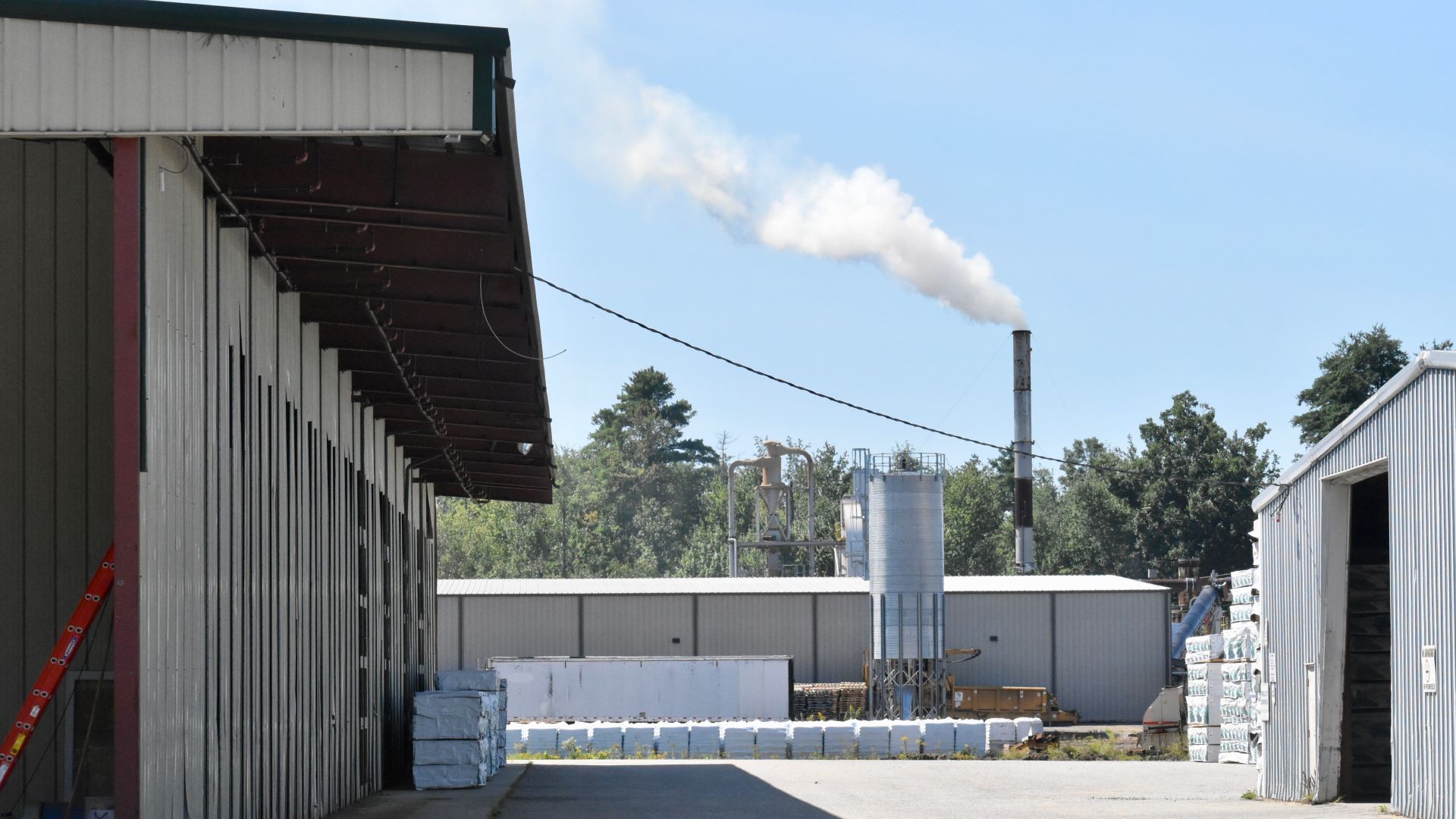State officials voted Thursday morning to fine the operators of a Sanford wood pellet manufacturing facility $151,550 for a string of violations dating back to 2020.
The violations – which include failing to meet testing deadlines, exceeding emissions requirements and failing to keep sufficient records — were ongoing even as the facility was awarded $600,000 in state funds in 2022. The money has not yet been distributed.
The plant, operated by T&D Wood Energy LLC and formerly included Player Design, Inc., has been the subject of several complaints made to the state Department of Environmental Protection over the years, DEP staff said at a Thursday meeting.
“There were numerous problems” from the beginning, Erik Kennedy, director of licensing and compliance for the Bureau of Air Quality, told the state Board of Environmental Protection, a group of citizens that oversees DEP decisions.
Neighbors complained of “smoke, odor, dust and noise” shortly after the plant started operating in 2018, said Kennedy, and it quickly “became apparent that the facility was not constructed as originally designed and permitted.”
Despite warnings from the department, issues abounded over the next few years. DEP staff conducted several full inspections and issued four license amendments to address noncompliance issues, said Kennedy, and worked extensively with the operators to help them understand what needed to be done to come into compliance.
Kennedy said the penalty might seem low but is “probably one of the higher penalties that we have sought for a facility of this size.”
Just two years ago, T&D Wood was awarded a $600,000 grant as part of a program to help Maine’s forestry sector recover from financial hardships incurred during the COVID-19 pandemic.
Many of the violations outlined in the administrative consent agreement were ongoing at the time of the award and were also identified by The Maine Monitor in 2023.
The Monitor found that the Maine Technology Institute, a nonprofit created by the legislature to distribute grants, did not investigate applicants’ histories of environmental compliance, and compliance was not a requirement of the state recovery plan that funded the grant.
Instead, MTI shared the list of grant recipients with the state’s Department of Economic and Community Development, and Department of Agriculture, Conservation and Forestry, before contracting with the awardees, MTI president Brian Whitney previously told The Monitor.
After the awards were announced, MTI “learned that T&D Wood was not in compliance with DEP,” Whitney wrote to The Monitor in August 2023. “(T)hat contract and conditional award has not moved forward pending resolution of the outstanding issues with the state.”
That award is still on hold, said Victoria Foley, a Department of Economic and Community Development representative, in an email after the Thursday meeting.
“MTI will review the consent agreement and any other relevant information before deciding how, and if, to proceed with the award.”
In an interview last week, Tony Wood, owner of T&D Wood Energy, said many of the violations resulted from an inaccurately written air emissions license based on a faulty model of the facility’s actual capabilities.
Wood claimed the emissions cap set by the state for volatile organic compounds (tiny aerosols released from the wood drying process) was set too low, the facility would exceed it, Wood said, resulting in violations.
“The results were just very different from what we had in the license in the beginning,” Wood told the Monitor. “We were working hard to try to figure out what was wrong. After years of pounding our heads on that … we ended up arriving at that conclusion with the state.”
A department spokesperson declined to address Wood’s claims before the meeting, saying DEP does not comment on open enforcement actions.
Andy Hamilton, an attorney representing the company, said Thursday the penalty was one of the highest he’d seen for a facility of T&D’s size.
“We’ve taken responsibility for that for which we’re responsible,” said Hamilton, adding that using softwood rather than hardwood as an input “presents a unique and dynamic challenge for wood product manufacturing facilities.”
T&D Wood Energy has lost nearly $2 million since 2019, Hamilton said. The only year it turned a profit ($121,000) during those years was in 2022.
During that time the plant repeatedly exceeded hourly emission caps on a tiny particulate pollutant called PM 2.5 (often appearing as haze or smoke), which can cause serious lung and heart issues, according to the U.S. Environmental Agency.
An amendment to the facility’s air emission license in 2023 removed Player Design Inc. as a license holder, making T&D Wood solely responsible for the facility.
Wood also noted the company’s emission violations were failures to meet hourly testing requirements and the facility did not come close to exceeding yearly emissions.
In addition to the air emissions exceedances, the consent agreement outlines numerous lapses in recordkeeping and a failure to report emission test results to the DEP on time.
Wood said many of the lapses came during the pandemic, when it took weeks for labs to return emissions test results and Wood found himself writing the reports the day they were due.
Another issue, he said, was the company’s staff members at the time. Wood said half of them have been fired and replaced.
“We had employees and operators that don’t do paperwork because they don’t feel like it, and that all falls back to me,” Wood said. “That made it pretty hard to always be completed on time. But we’ve really built a good team here now.”
Wood said he addressed concerns about the facility’s emissions from neighboring residents by offering a tour of the facility, explaining the production process and answering questions.
Wood described his company as a family-owned business working to produce an environmentally compliant product and contribute to the Maine forestry sector. He and his father spent 12 years planning their wood pellet facility, he said, but operating it has come with challenges, and they’re working to get on track.
“My father and I have worked our butts off and sacrificed everything that we had … to try to make sure that it was done right and that we were compliant,” Wood said.
Tyler Player, owner of Player Design, Inc., did not respond to a request for comment.
In addition to the fine, T&D Wood will have to demonstrate compliance with facility operation procedures, provide detailed plans for how the facility will reduce particulate emissions and provide timely inspection reports. Failure to comply could result in fines of $500 a day.
It has “been a long and frustrating road at times to get to this point,” said Kennedy of the DEP.







